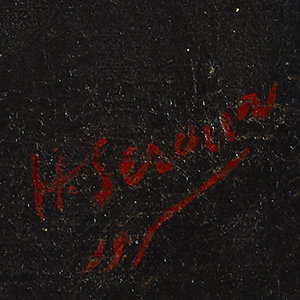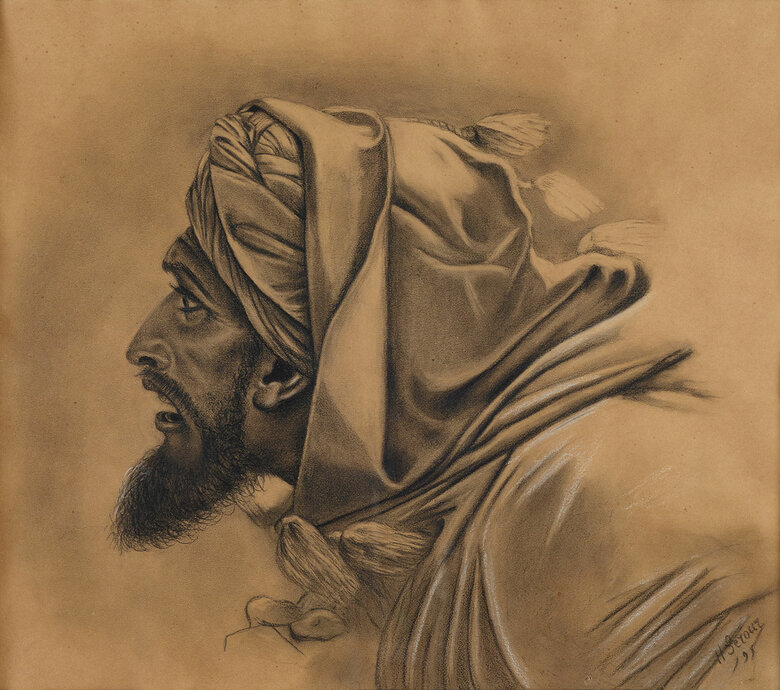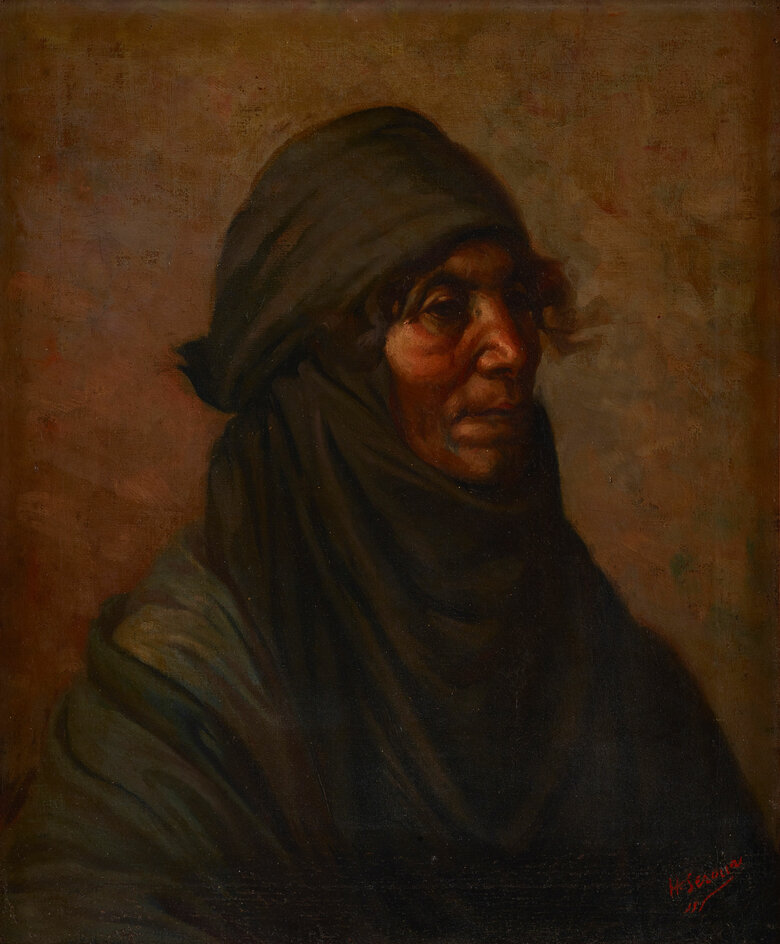A pioneer of the Lebanese artistic renaissance of the late 19th century, Habib Serour was known as a master of portraiture and religious painting. Born in Beirut in 1863, Serour left in his early...


HABIB SEROUR, Lebanon (1863 - 1938)
Bio
Written by FADIA ANTAR
A pioneer of the Lebanese artistic renaissance of the late 19th century, Habib Serour was known as a master of portraiture and religious painting. Born in Beirut in 1863, Serour left in his early teenage years to live with his family in Rome. Here, he studied painting under Roberto Bompiani, a professor and president of the Accademia di San Luca in Rome. Serour returned to Beirut in the 1890s after an extended stay in Egypt. He taught art at the Ottoman Imperial School in Bashoura, as well as in his studio in the confines of Alfred Sursock's private home. By establishing one of the first art workshops in Lebanon, Serour laid the foundations for an artistic renaissance that would launch a generation of artists such as Moustafa Farroukh, Rashid Wehbe and Saliba Douaihy. Serour was also behind the discovery of the artistic talent of Gibran Khalil Gibran, who frequented his summer studio in Bsharré.
A portraitist in high demand among the élite, Serour adapted his taste to that of his clients while remaining faithful to classical forms in his portraiture and religious commissions. Challenging pure formalist representation, Serour often allowed himself the freedom to paint non-commissioned portraits of ordinary people with a unique realism that disclosed their psychic depths. Capturing the anatomical vitality of his models revealed Serour’s acute perception and ability to achieve near-perfect resemblances. The artist additionally made religious paintings that showcased his skill for classical iconographic composition.
During his stay in Egypt, Serour witnessed the Orientalist art that dominated Cairo salons in the late 19th and early 20th centuries. He became interested in subjects such as Bedouins and nomads, though avoided objectifying them with the idealistic exoticism that was popular among European artists at the time. Serour instead focused on their power in the face of hardship. His body of work originated what became known as the school of rural realism, which espoused a style of sensitive mimesis that is apparent in his portraits, landscapes, costumes and still lifes.
Lebanon and its environs faced much economic, social and political change in the era leading up to World War I. This was exacerbated under the tyranny of Ottoman ruler Gamal Pasha the Assassin (r. 1893-1918), who imposed a fishing ban on a country already struck by waves of famine, poverty, and homelessness. While visiting a friend who had just returned from sea with an abundant clandestine catch, Serour painted each fish with intense realism and darkness that echoed the consequences of the ban. Paintings like these cemented Serour as a witness and commentator of his time.
Serour passed away in 1938, leaving behind a legacy of art education that was foundational to modern Lebanese art.
Sources
Sultan, Maha Azizeh, Dr. (١٨٧٠-١٩٣٨) -روّاد من نهضة الفنّ التشكيلي في لبنان - القرم و سرور و الصليبي. Kaslik: University of the Holy Spirit, 2006.
Sultan, Faisal, Dr. كتابات مستعادة من ذاكرة فنون بيروت. Beirut: Kitab Assafir. Dar El Farabi, 2013.
Telelibantv. "5 de PIC - tele liban - Randa Sadaka - Habib Srour." YouTube. January 12, 2017. Accessed December 19, 2017. https://www.youtube.com/watch?v=Y39cATOi_vw
Abillama, Nour Salamé, Marie Tomb, Amin Maalouf, Joseph Tarrab, Cesar Nammour, Maha Azizé Sultan, Fayçal Sultan, and Gregory Buchakjian. Art from Lebanon: modern and contemporary artists, 216-227. Beirut, Lebanon: Wonderful editions, 2012.
Chahine, Richard. One Hundred Years of Plastic Arts in Lebanon, 1880-1980, vols. I&II. (Beirut: Chahine Gallery, 1980), 7.
Matar, William. One Fine Art | Artists - Painters / Habib Srour. Accessed December 19, 2017. https://www.onefineart.com/artists/painters/habib-srour
CV
Selected Solo Exhibitions
1964
Retrospective at AUB Alumni Club, Beirut, Lebanon
1934
Retrospective at Saint Georges Hotel, Beirut, Lebanon
Selected Group Exhibitions
2018
A Century in Flux, Sharjah Art Museum, Sharjah, UAE
2017
Lines of Subjectivity: Portrait and Landscape Paintings, Jordan National Gallery, Amman, Jordan
2016
The Arab Nude, American University of Beirut, AUB art Galleries, Beirut, Lebanon
2012
Art from Lebanon, Beirut Exhibition Center, Beirut, Lebanon
Le Corps Découvert, Institut du Monde Arabe, France
2001
L’Art Libanais, Sursock Museum, Beirut, Lebanon
1964
Alumni club house, American University of Beirut, Lebanon
1931
Beirut School of Art and Crafts, Beirut, Lebanon
1921
Foire de Beyrouth, at the Tower Square, Beirut, Lebanon
Collections
Nicolas Sursock Museum, Beirut, Lebanon
The Mokbel art collection, Beirut, Lebanon
Barjeel Art Foundation, Sharjah, UAE
Ramzi and Saeda Dalloul Art foundation, Beirut, Lebanon
National Virtual Museum, Ministry of Culture, Beirut, Lebanon
Honors
The Municipality of Beirut named a street after him
1974
The Municipality of Beirut issued a stamp bearing the artist'sauto portrait, Beirut, Lebanon
1938
Honorary Lebanese Medal of Merit, Lebanon
1936
The Order of Knowledge from the French authorities, Beirut, Lebanon
Documents
How Painting Came East
Charbel Dagher
Al Jadid, English, 2006
Magazine p 4,6
Regards sur la peinture au Liban
Joseph Abou Rizk
ALBA, French, 2012
Excerpt from book pp. 16,17,18
حديقة ضيوف الفن الإنطباعي اللبناني
Riad Fakhoury
Galerie d'art Bekhazi, Arabic, 1993
Excerpt from book pp. 43, 44
Cent Ans d'Art Plastique Au Liban I. One Hundred Years of Plastic Arts in Lebanon I
Chahine Gallery
Chahine Gallery, English, Arabic, French, 1982
Excerpt p.2
كتابات مستعادة من ذاكرة فنون بيروت
Faysal Sultan
Dar Alfarabi, Arabic, 2013
Excerpt from book pp. 40 to 43
Art From Lebanon. Modern and Contemporary Artists 1880-1975
Nour Salame Abillama & Marie Tomb
Wonderful Editions, English, 2012
Excerpt from book pp. 36 to 41
Press
"المعرض" معرضاً تشكيلياً
م. ز.
newspaper.annahar.com, Arabic, 2013
حبيب سرور فنان مجدد تمرد على اللوحة الدينية
فاروق يوسف
alarab.co.uk, Arabic, 2017
فنانون راحلون من بلادي بقلم:حسين أحمد سليم
حسين أحمد سليم
pulpit.alwatanvoice.com, Arabic, 2006
مائة عام على ولادة فنان بيروت رشيد وهبي موسيقى الألوان الطبيعية..وذكاء نادر في التأليف
عمران قيسي
aliwaa.com.lb, Arabic, 2017
ART- La famille Rubeiz offre deux portraits signes Habib Srour au musee Sursock- Un avant-gout de "l'art libanais"
lorientlejour.com, French, 2001
Thoughts on the bare naked Arab
Jim Quilty
dailystar.com.lb, English, 2016
HABIB SEROUR Artwork
Become a Member
Join us in our endless discovery of modern and contemporary Arab art
Become a Member
Get updates from DAF
Follow Artists
Save your favourite Artworks
Share your perspectives on Artworks
Be part of our community
It's Free!
We value your privacy
TermsCookiesPrivacy Policies
Become a Member
Get updates from DAF
Follow Artists
Save your favourite Artworks
Share your perspectives on Artworks
Be part of our community
It's Free!
We value your privacy
TermsCookiesPrivacy Policies
Become a Member
Get updates from DAF
Follow Artists
Save your favourite Artworks
Share your perspectives on Artworks
Be part of our community
It's Free!
We value your privacy
TermsCookiesPrivacy Policies
Welcome to the Dalloul Art Foundation
Thank you for joining our community
If you have entered your email to become a member of the Dalloul Art Foundation, please click the button below to confirm your email and agree to our Terms, Cookie & Privacy policies.
We value your privacy, see how
Become a Member
Get updates from DAF
Follow Artists
Save your favourite Artworks
Share your perspectives on Artworks
Be part of our community
It's Free!
We value your privacy
TermsCookiesPrivacy Policies






